450 Bushmaster vs 458 SOCOM vs 50 Beowulf: Big Bore AR Cartridges
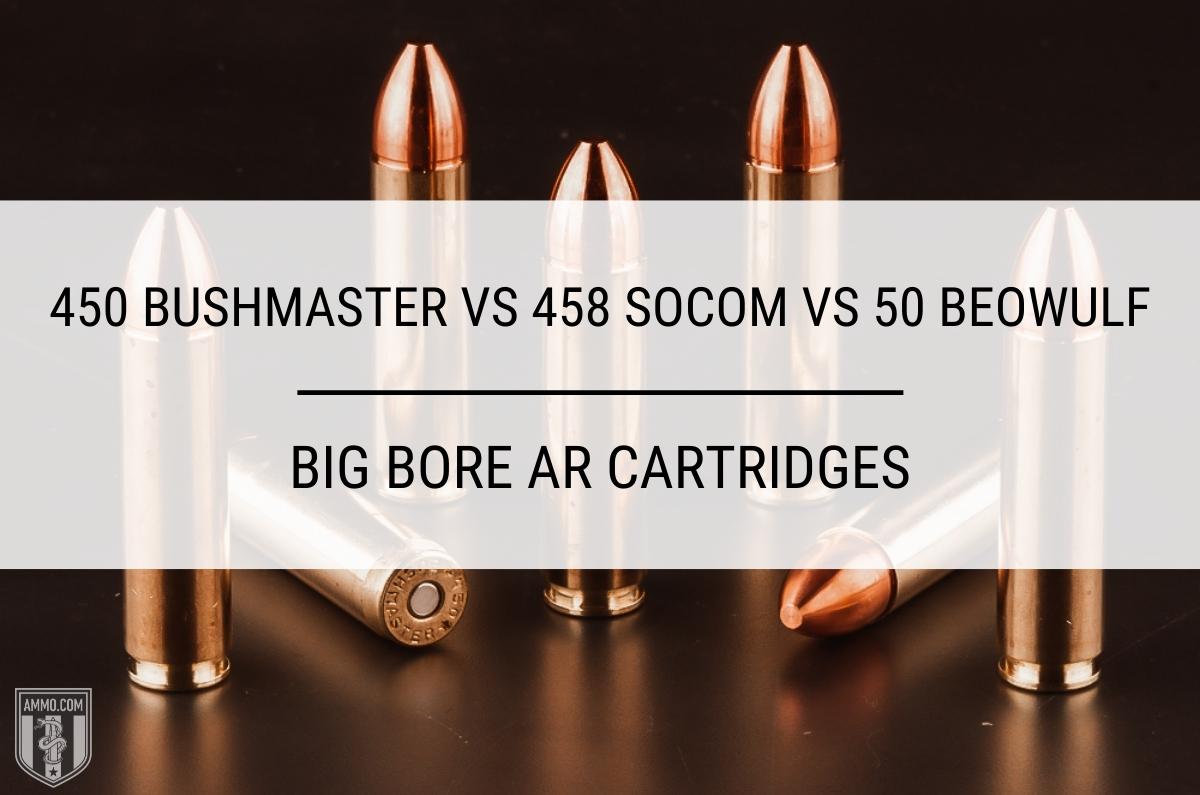
There’s no denying that the pairing of the AR-15 platform and the 223 Remington is an exceptional match. The 223’s flat trajectory and low recoil is great for varmint hunting, plinking, and target shooting; however, it lacks the kinetic energy needed for taking down larger animals like whitetail and hogs.
Adapting new calibers to the AR-15 rifle is nothing new, and cartridges like the 300 Blackout, 224 Valkyrie, 6.8 SPC, and 6.5 Grendel have all been moderately successful.
But some shooters wanted more…they wanted more muzzle energy, more fps, more stopping power.
And for those shooters who just want MORE, this trifecta of Thumper rounds can provide all the kinetic energy and recoil your heart could desire – the 450 Bushmaster, 458 SOCOM, and 50 Beowulf.
These three big bore cartridges give you the flexibility to turn a standard AR-15 into a deer hunting rifle, a semi-automatic hog slayer, and a heavy-hitting personal defense carbine all rolled up into one firearm.
Although the terminal ballistics and effective range of all three rounds are similar, each cartridge is unique and has its own advantages and disadvantages that shooters need to weigh before upgrading their AR-15.
In this article we will analyze each cartridge to help you decide which Thumper round will work best for your shooting needs.
Cartridge Specs
When evaluating centerfire rifle cartridges, it’s a good idea to analyze the cartridge specs to gain more knowledge of each.
The 50 Beowulf was the first of the three thumper rounds to hit the market in early 2001 although the 458 SOCOM was released shortly after in the same year while the 450 Bushmaster was released in 2007.
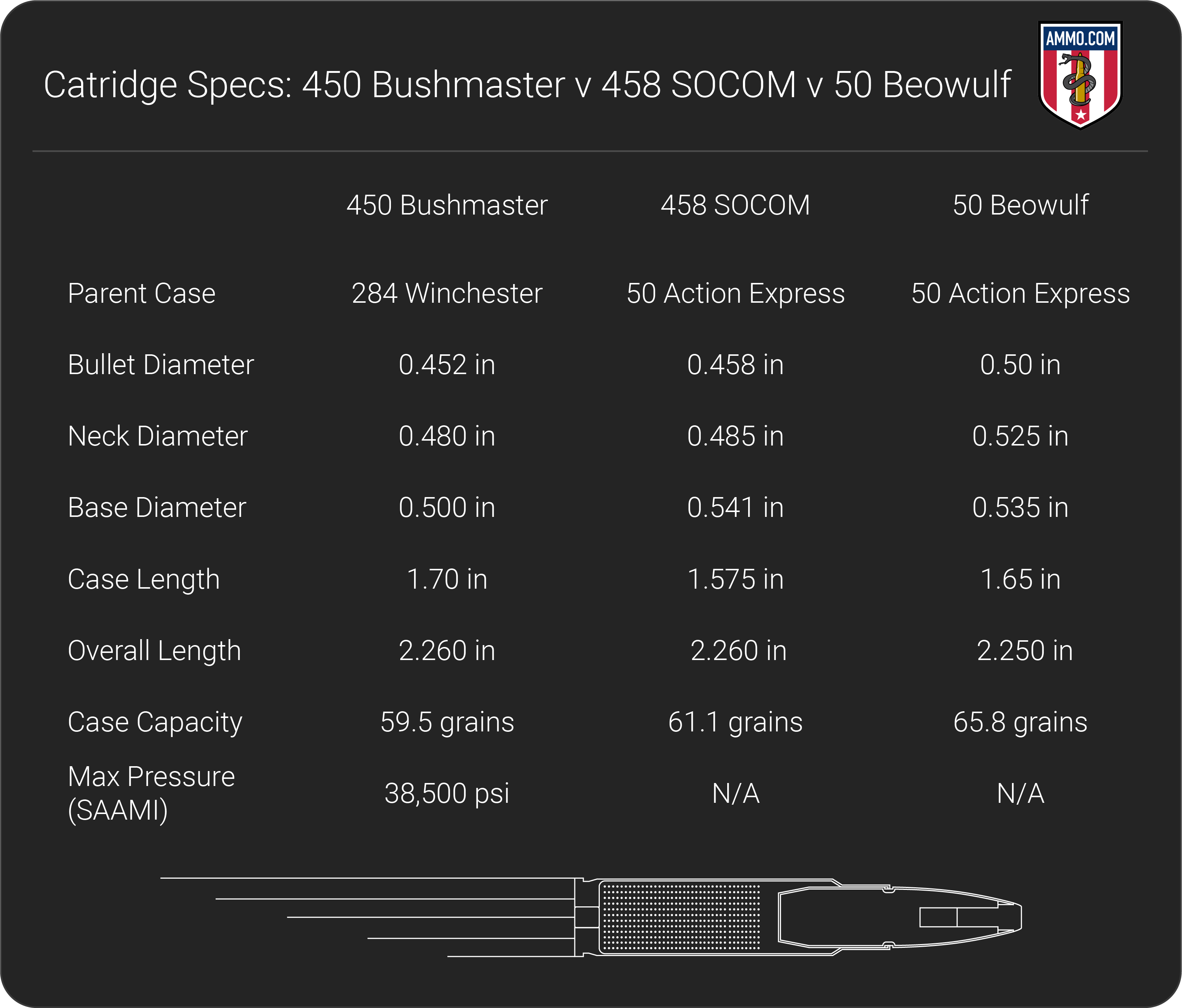
Developed by Alexander Arms, not much is known about the genesis of the 50 Beowulf as Bill Alexander is known for keeping company matters a closely guarded secret.
On the other hand, development of the 458 SOCOM began in 2000 in response to a conversation (supposedly at a barbecue) between Marty Ter Weeme of Teppo Jutsu LLC and a member of the United States Special Operations Command (SOCOM) surrounding the ineffectiveness of the 5.56 NATO round in the Battle of Mogadishu in 1993.
The 450 Bushmaster (or 450 BM) was developed by Tim LeGendre of LeMAG Firearm. LeGendre cites Lt. Col. Jeff Cooper’s writings on the Thumper concept as his inspiration for creating the 450 BM.
Perhaps the biggest difference between these three cartridges is their case design itself. The 450 Bushmaster and 50 Beowulf are both straight-walled cartridges while the 458 SOCOM has a slight shoulder. A straight-walled cartridge is necessary for deer hunting in Midwest states like Ohio, Iowa, Indiana, and Michigan while the bottlenecked design aids in reliable feeding.
Although developed under different circumstances, both the Beowulf and the SOCOM share the same parent case. A lengthened 50 Action Express, or 50 AE, was utilized for both cartridges, though the 50 Beowulf has a longer case at 1.65” compared to 1.575” for the 458. The 50 AE is most well-known for being the primary chambering of the Desert Eagle handgun. In contrast, the 450 Bushmaster was developed using the 284 Winchester as a parent case and has the longest case length at 1.70”.
Although their case length is different, the 450 Bushmaster and 458 SOCOM have the same maximum overall length of 2.26” as this is the longest cartridge length that can be used in an AR-15 receiver. The 50 Beowulf lists its maximum overall length as 2.25”.
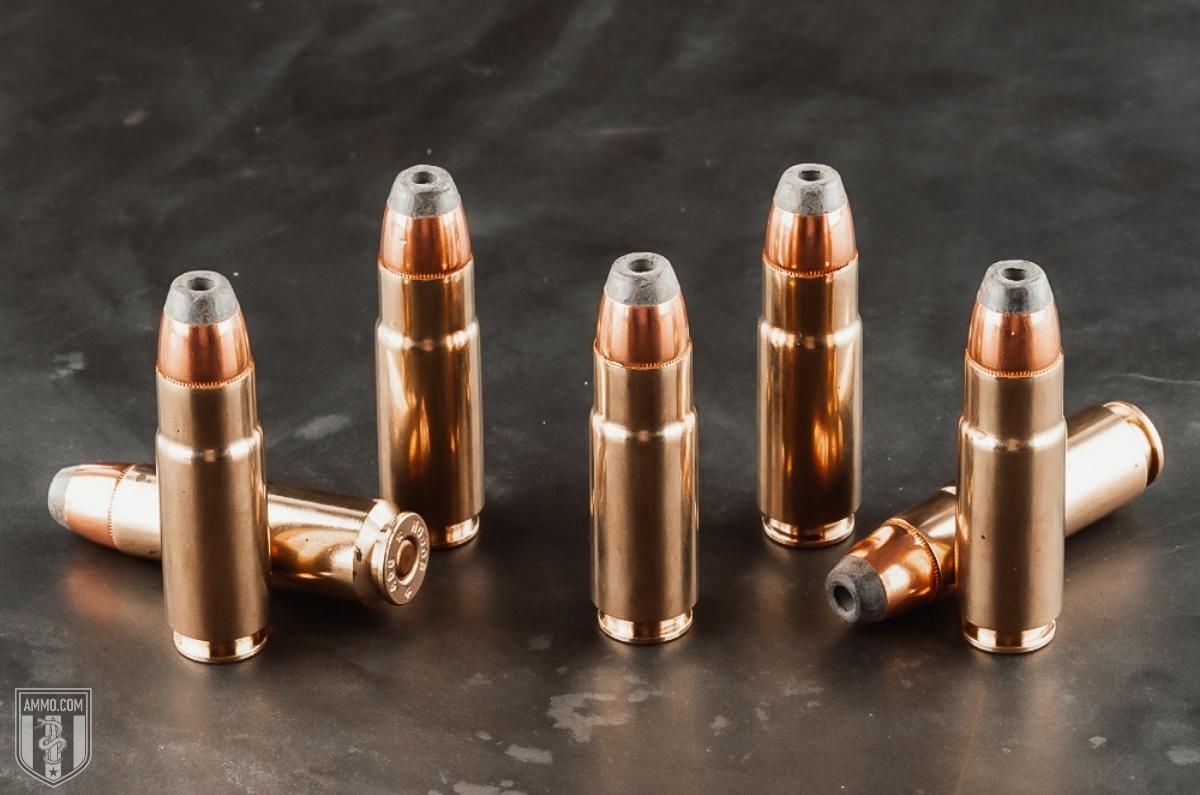
All three rounds have a rebated rim design, meaning their rim is narrower than their cartridge base. The 450 BM and 458 SOCOM have the same rim diameter of 0.473”, which is the same as the 308 Winchester, 30-06 Springfield, and 270 Win. In contrast, the 50 Beowulf has a 0.447” diameter rim which is the same as another round made by Alexander Arms, the 6.5 Grendel.
Another major difference between all three cartridges is the type of bullet each fire.
The 50 Beowulf fires a 0.50” diameter bullet like the 500 S&W Magnum and 50 AE. Beowulf ammo comes in bullet weights ranging between 200 and 600 grains, though 335, 350, and 400 grain bullets are the most common.
In contrast, the 458 SOCOM fires a 0.458” diameter bullet which is much more common as this bullet diameter is used by rounds such as the .45-70 Government, 458 Winchester Magnum, 450 Marlin, 460 Weatherby, and 458 Lott. The SOCOM round can fire bullets within the same 200-600 grain range, though 250gr, 300gr, and 350gr factory loads are the most common.
Lastly, the 450 Bushmaster fires 0.452” diameter bullets ranging between 158-300 grains while the 250 and 260 grain bullets are the most popular factory loads. In contrast, the 458 can fire bullets between 200 to 600 grains with 250gr, 300gr, and 350gr being more common. Bullets fire by the 450 Bushmaster are also fired by three popular handgun cartridges, the 45 Colt, 454 Casull, and 460 S&W.
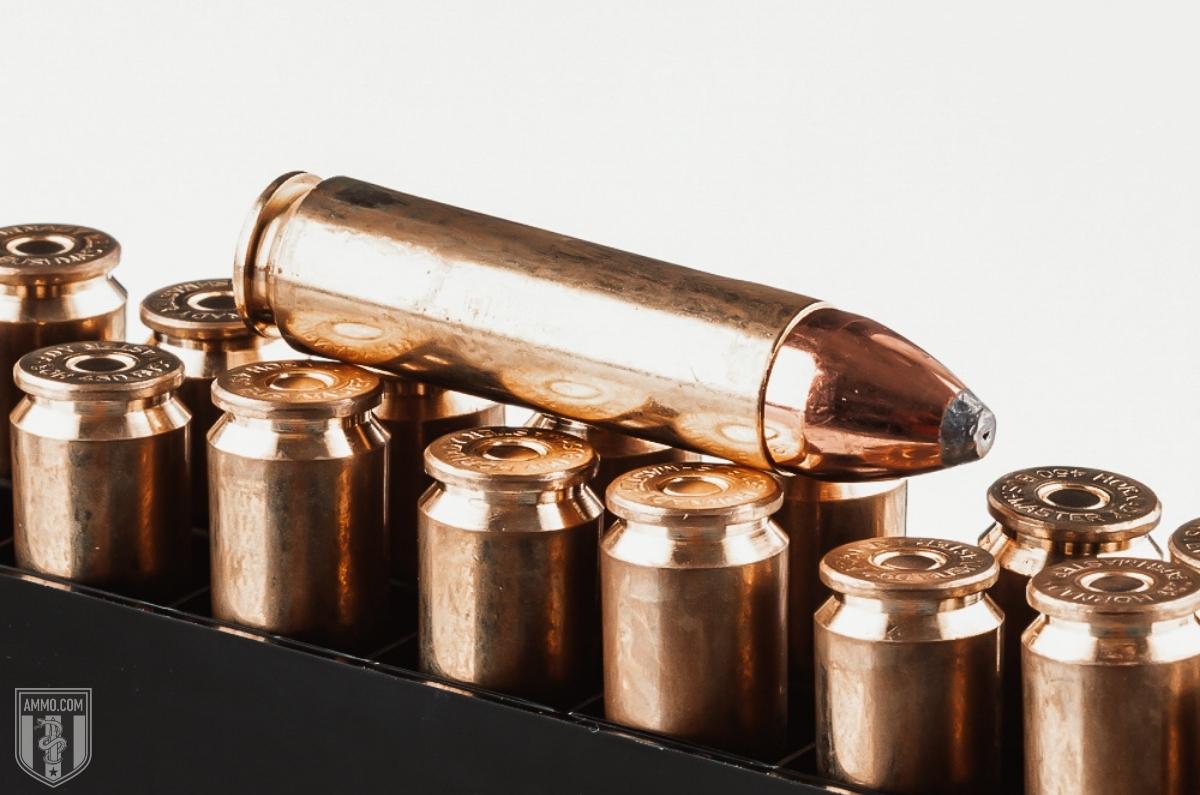
All three rounds are generally loaded to similar pressures, but the 450 Bushmaster is the only SAAMI certified cartridge of the three with a listed maximum pressure of 38,500 psi. Furthermore, the 50 Beowulf name is trademarked by Alexander Arms. To avoid any potential trademark litigation, ammo manufacturers will often brand their 50 Beowulf ammo by its metric designation, 12.7x42mm.
Muzzle Velocity, Kinetic Energy, and Trajectory
Lt. Col. Jeff Cooper defined the “Thumper concept” as a cartridge designed to be fired from the semi-auto AR-15, had an effective range around 250 yards, was 44-caliber or larger, and could harvest large game with one shot.
All three of these rounds fit the bill in terms of integrating into the AR-15 platform and being larger than 44-caliber, but how do they stack up in terms of ballistics?
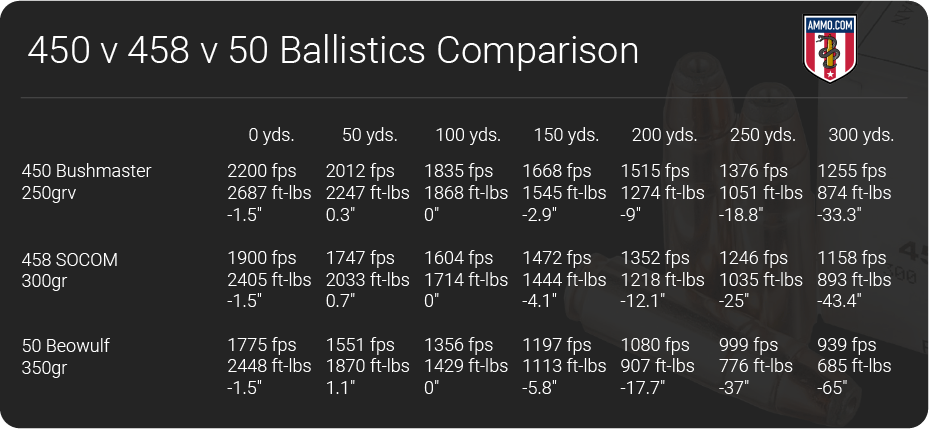
For the purposes of this comparison, we will analyze the ballistic performance of the 250 gr Hornady FTX for 450 Bushmaster, the Barnes 300-grain TTSX loaded by Buffalo Bore for 458 SOCOM, and the 350gr XTP jacketed hollow point loaded by Underwood Ammo for 50 Beowulf.
In the chart below, we will compare muzzle velocity, kinetic energy, and bullet drop for each cartridge assuming a 100 yard zero.
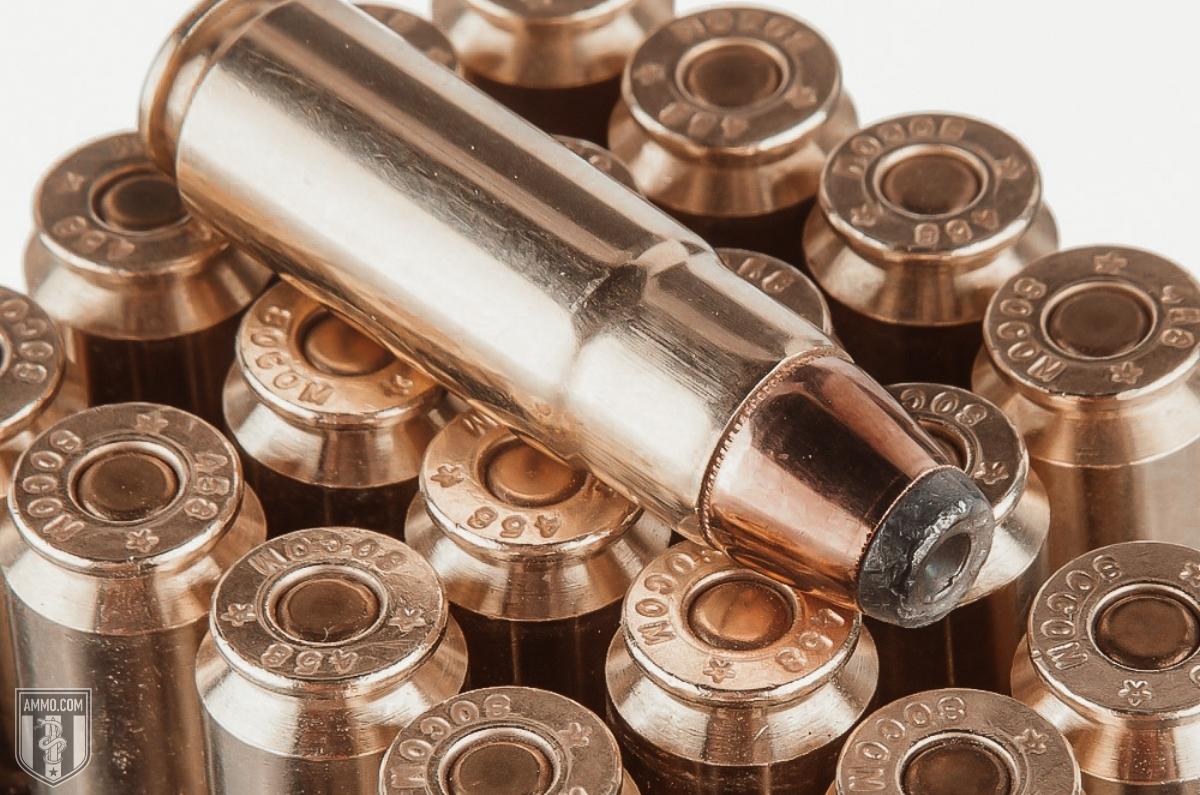
The 450 Bushmaster dominates in terms of muzzle velocity as it leaves the barrel at a whopping 2,200 fps, which is 300 fps faster than the 458 SOCOM and 425 fps faster than the 50 Beowulf. This high muzzle velocity gives the 450 Bushmaster a flatter trajectory out to 250 yards, although the 458 SOCOM is a very close second in terms of bullet drop.
In terms of muzzle energy, the 450 Bushmaster continues to outperform at 2,687 ft-lbs, followed by the 50 Beowulf at 2,448 ft-lbs, with the 458 SOCOM bringing up the rear at 2,405 ft-lbs.
Although there are minor differences between these three rounds, all of them have similar performance out to 150 yards. The performance of the 50 Beowulf drops off considerably past 150 yards as the bullet goes subsonic at this range. On the other hand, the 450 Bushmaster and 458 SOCOM can remain supersonic past 300 yards.
Hunters generally consider 1,000 ft-lbs of kinetic energy the minimum amount required for harvesting a whitetail and 1,500 ft-lbs for elk. This means that the 50 Beowulf effective range for deer is around 150 yards and 100 yards for elk. In contrast, the 450 Bushmaster and 458 SOCOM have an effective range of 250 yards for deer and 150 yards for elk.
Recoil
There’s a reason why this class of rifle cartridges are known as “thumper rounds”. Not only do they hit hard on large game, but they impart stout recoil on the shooter’s shoulder as well.
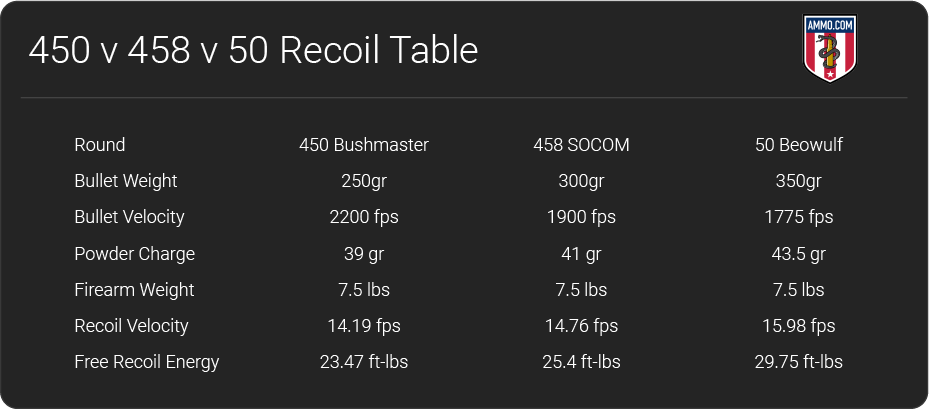
Felt recoil will differ from shooter to shooter and is dependent on shooting position, stance, and the firearm being used. However, free recoil can be used to give a general idea of how hard a round kicks.
Free recoil is dependent on bullet weight, rifle weight, muzzle velocity, and powder charge. To provide a clean “apples to apples” comparison, a standard AR-15 carbine weight (7.5 lbs) will be used for each calculation.
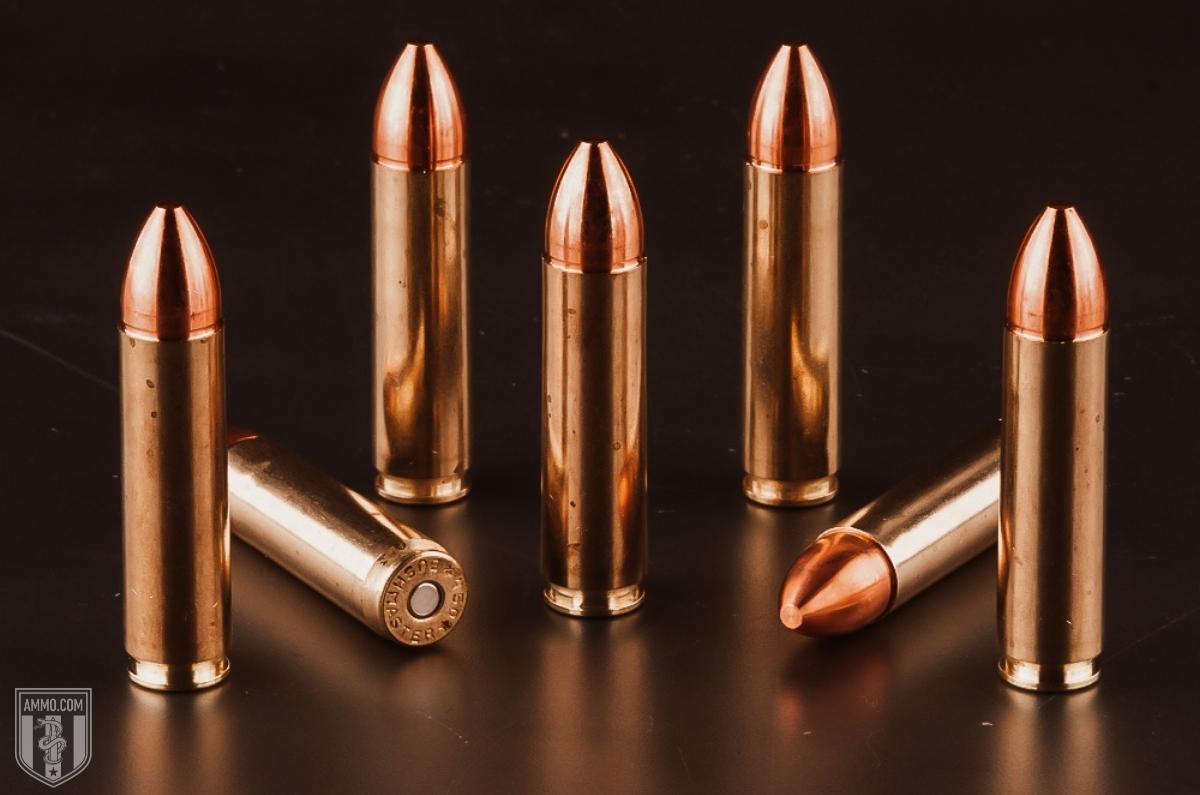
This may not be completely accurate in terms of real-world experience, as 50 Beowulf rifles are generally a little heavier than 450 Bushmaster rifles. However, the chart below will give you a general idea of how much recoil each cartridge imparts on the shooter.
It should be noted that none of these cartridges would be described as having low recoil. However, as the 450 Bushmaster fires lighter bullets, it has less recoil than the 458 SOCOM and 50 Beowulf.
Ballistic Coefficient and Sectional Density
Ballistic coefficient (BC) is a measure of how aerodynamic a bullet is and how well it will resist wind deflection. Sectional density (SD) is a way to evaluate the penetration ability of a bullet based on its external dimensions, design, and weight.
In the table below, we’ve listed the ballistic coefficient and sectional density for our selection of 3 rounds.
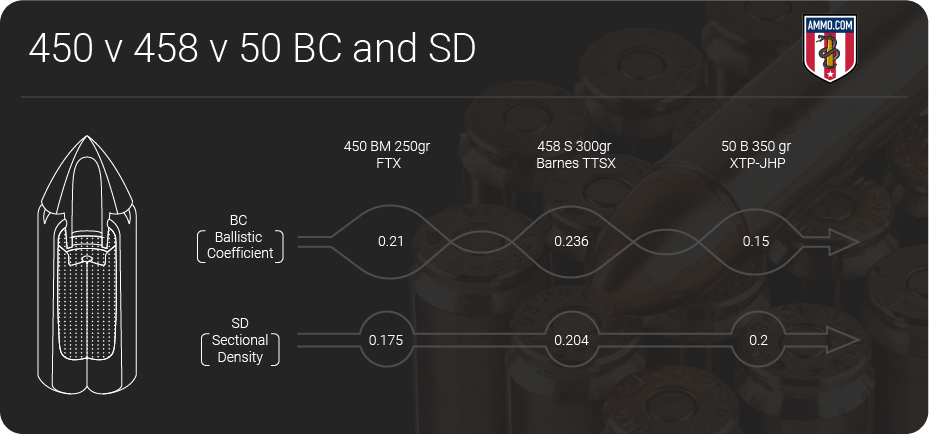
In terms of ballistic coefficient, the 458 SOCOM has the highest at 0.236, followed by the Bushmaster at 0.21, and the Beowulf at 0.15.
Typically, longer and heavier bullets will have a higher BC as they can resist wind drift more efficiently. The 50 is the heaviest bullet of the three, but it has the lowest BC due to its design.
Each of these rounds are limited in their design capabilities due to the restrictions of the AR-15 platform. Restricting the maximum overall length of a cartridge to 2.26” and demanding kinetic energy values over 2,000 ft-lbs means that bullet design must take a back seat to external ballistics. Therefore, short and thick bullets have to be used instead of more aerodynamic designs.
In terms of penetration, the Beowulf and SOCOM are essentially tied at 0.2 and 0.204, respectively, with the Bushmaster coming in last at 0.175.
It is unlikely that the whitetail or hog in your sights will be able to detect any differences in penetration, however the 458 and 50 will penetrate just a bit deeper than the 450.
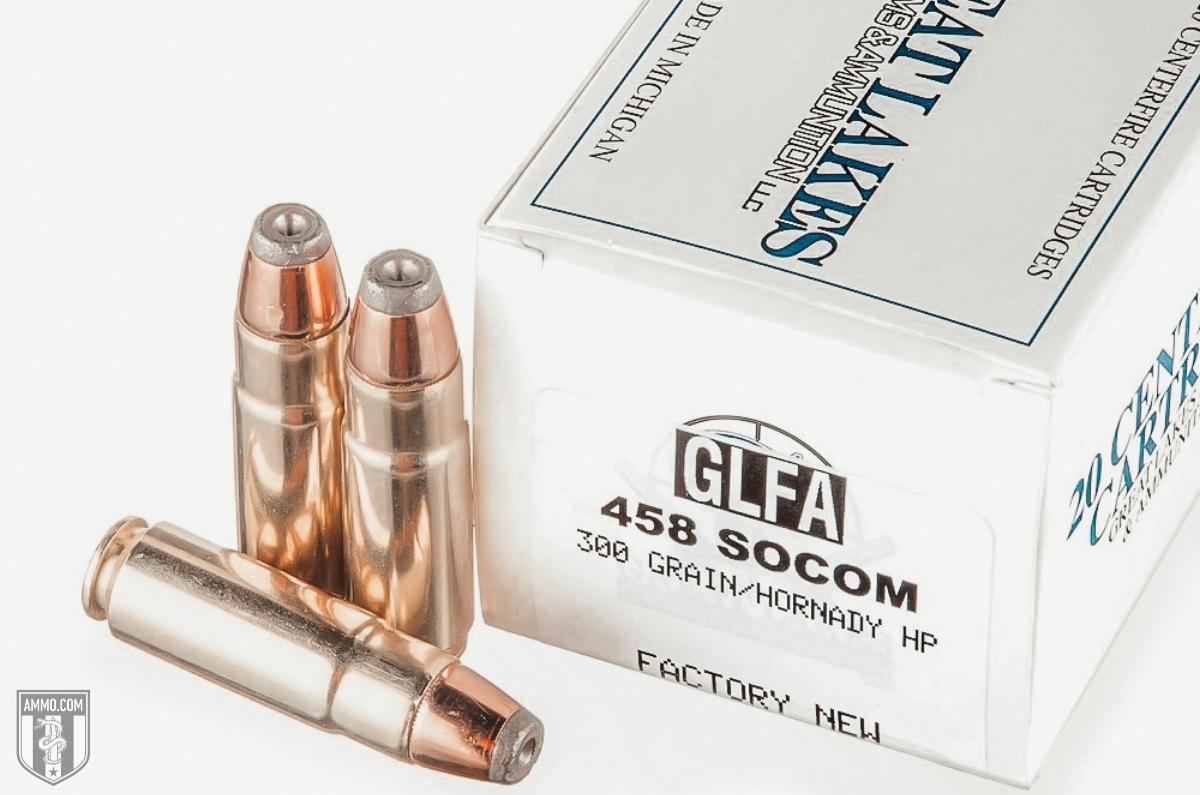
50 Beowulf vs 458 SOCOM
The 50 Beowulf fires wider and heavier bullets than the 458 SOCOM. Although it fires a lighter bullet, the 458 SOCOM has a maximum effective range of around 250 yards on large game while the less efficient bullet design of the Beowulf limits its effective range to 150 yards. The 50 Beowulf also has higher recoil.
450 Bushmaster vs 458 SOCOM
The 450 Bushmaster and 458 SOCOM have similar ballistic performance out to 250 yards, which is the maximum effective range for both rifle cartridges. However, the 450 Bushmaster has a flatter trajectory as it fires lighter bullets at higher muzzle velocities. The 458 SOCOM also has slightly more recoil.
450 Bushmaster vs 50 Beowulf
The 450 Bushmaster has higher muzzle velocity, more kinetic energy, and a longer effective range than the 50 Beowulf. The 50 Beowulf has about 25% more free recoil than the 450 Bushmaster, but the Beowulf also has higher sectional density.
Hunting
When it comes to big game hunting, all three cartridges are excellent options within their effective range.
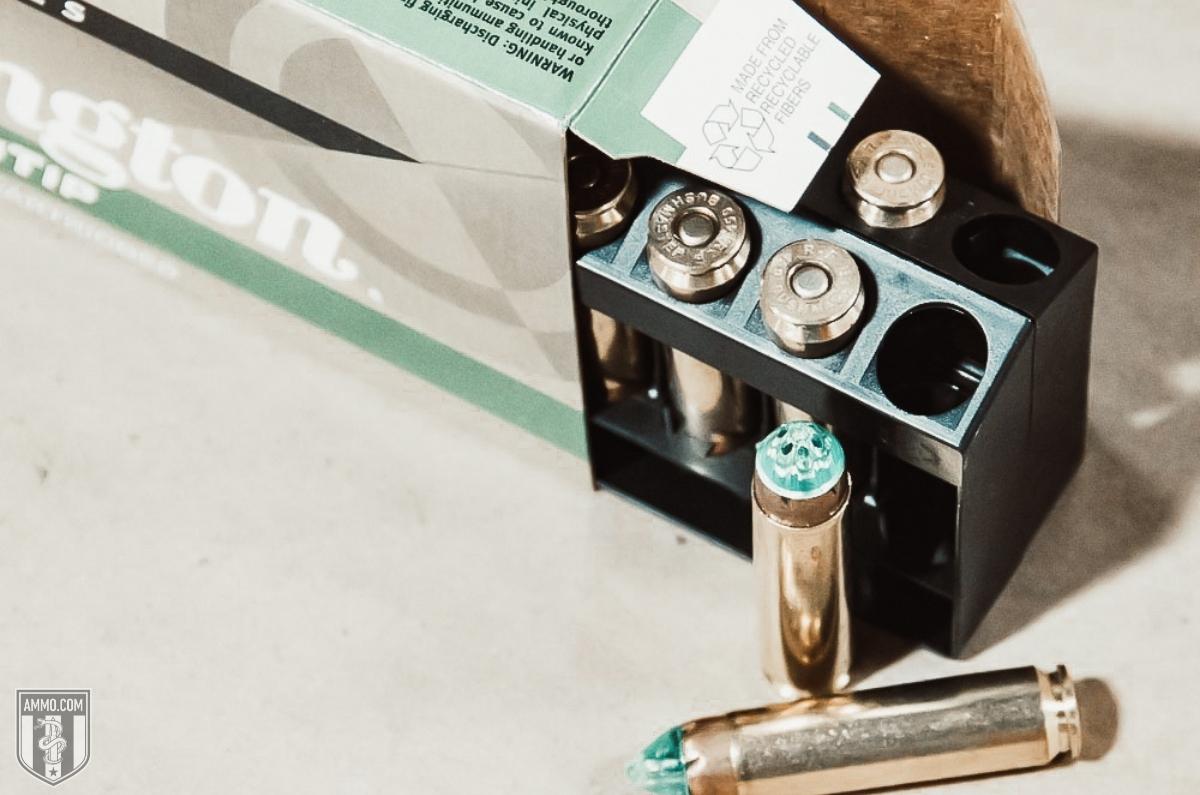
The 450 Bushmaster and 50 Beowulf are excellent deer hunting options in states that require the use of straight-walled cartridges. On the other hand, the 458 SOCOM offers similar ballistic performance to the 450 Bushmaster with heavier bullets.
The primary limiting factor for the 50 Beowulf is its shorter effective range. For elk, the Beowulf is limited to 100-yard shots and 150 yards for deer. Although the 50 fires the largest caliber bullet of the three, its inefficient bullet design hemorrhages velocity and kinetic energy down range and has gone completely subsonic at 200 yards.
For 450 and 458, elk can be taken safely within 150 yards while whitetail can be ethically harvested at 250 yards. This is why many hunters prefer the 450 Bushmaster and 458 SOCOM as it allows them to harvest game at longer ranges.
All three rounds are excellent choices for hogs, coyotes, and general pests. However, hunters generally lean on the 223 Remington for varmint control for its lower price point and flatter trajectory.
Ammo and Rifle Cost/Availability
Of the three rounds, the 450 Bushmaster is the easiest to find factory ammo for as it is SAAMI certified and therefore larger ammo manufacturers like Hornady, Remington, Winchester, Barnes, and Federal make ammunition for it. On the other hand, only custom ammo manufacturers like Underwood Ammo, Buffalo Bore, and Black Butterfly make 458 SOCOM and 50 Beowulf rounds.
For 450 Bushmaster ammo, inexpensive Remington UMC factory loads can be had for as low as $1.50/round while premium hunting ammo like Federal Fusion or Barnes VOR-TX will cost around $3/round and up.
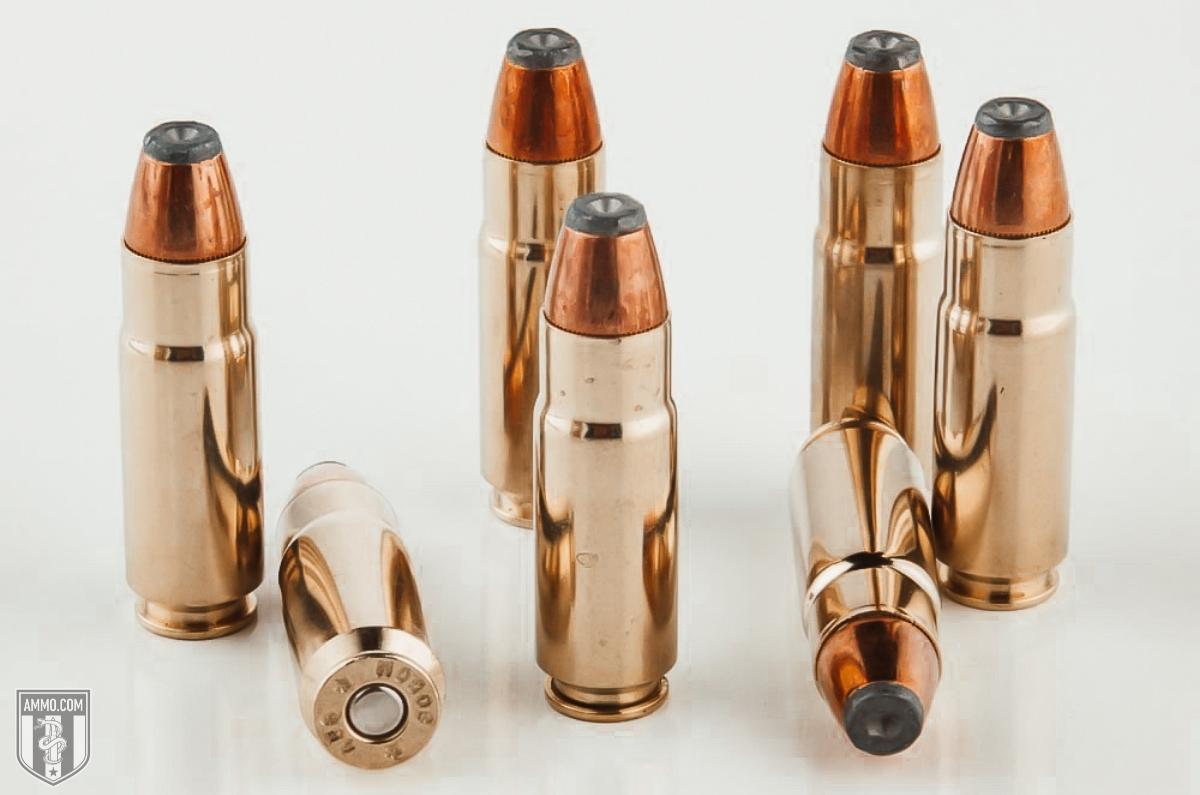
For the 458 SOCOM, less expensive factory loads from Underwood Ammo can be had for around $2/round while bear hunting hard cast loads from Buffalo Bore run upwards of $5/round.
Most of the factory ammo for 50 Beowulf comes from Alexander Arms as they hold the trademark on the cartridge name. However, custom ammo manufacturers often make their own 50 Beowulf loads under the metric designation 12.7x42mm. Factory ammo from Alexander Arms will run you around $1.70/round while custom ammo for hunting or personal defense will typically cost around $3/round.
In terms of rifle availability, there are considerably more options for the 450 Bushmaster compared to the 458 SOCOM and 50 Beowulf.
For the 458, the most common options available are AR-15 rifles from manufacturers like Tromix, Wilson Combat, and Bear Creek Arsenal (BCA). For the 50, Alexander Arms is the primary supplier of all rifles, parts, and upper receivers for the 50 Beowulf, though BCA is another option at a lower price point.
In contrast, as the 450 is SAAMI certified, there are considerably more rifle options including bolt-action rifles like the Ruger American and Savage 110.
However, as any AR-15 rifle is a potential host with a simple barrel, bolt, and magazine change, this means there are a lot of potential rifles on the market for all three cartridges.
Reloading
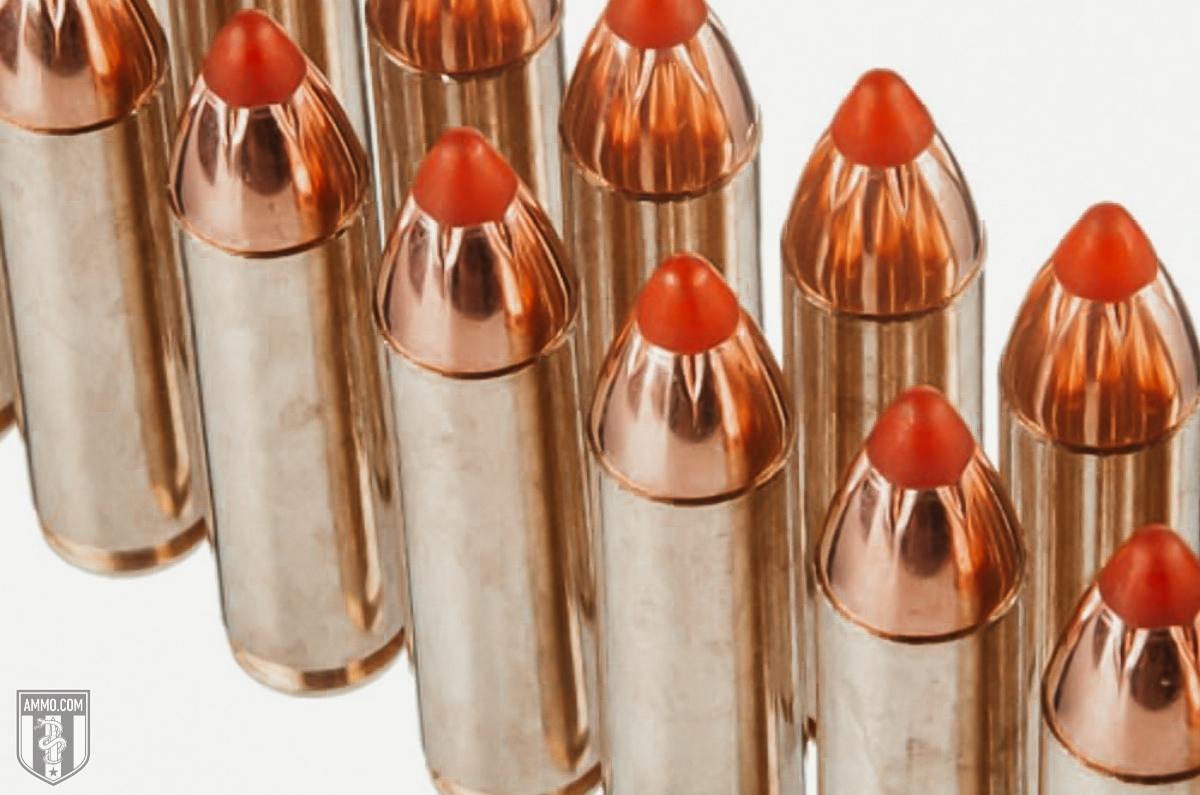
Although factory loads can be a little pricey for these big bore AR rounds, handloading is one method shooters utilize to reduce their overall cost per round.
All of the major bullet manufacturers like Barnes, Hornady, Nosler, Sierra, and Federal have multiple bullet options available for all three calibers. This allows hand loaders the flexibility to create rounds that are customized to their rifle and their unique shooting needs.
Sourcing reloading dies is fairly simple for each cartridge as Lee and Redding both have die sets for each caliber.
It should be noted that it is not advised to use 45 ACP handgun bullets for reloading the 450 Bushmaster. Jacketed 45 ACP bullets measure 0.451” in diameter while the 450 Bushmaster requires the slightly wider 0.452” diameter bullets. Although the smaller 0.451” diameter bullets can be handloaded safely, you will likely see decreased performance and accuracy as the bullet may not completely engage the rifling in the barrel.
Final Shots: 450 Bushmaster vs 458 SOCOM vs 50 Beowulf
The 450 Bushmaster, 458 SOCOM, and 50 Beowulf are three big bore cartridges that add a lot of stopping power to the AR-15 rifle. Designed for shots within 250 yards or less (<150 yards for the Beowulf), these three rounds deliver crippling kinetic energy that can transform any AR-15 into a capable hog and deer hunting rifle.
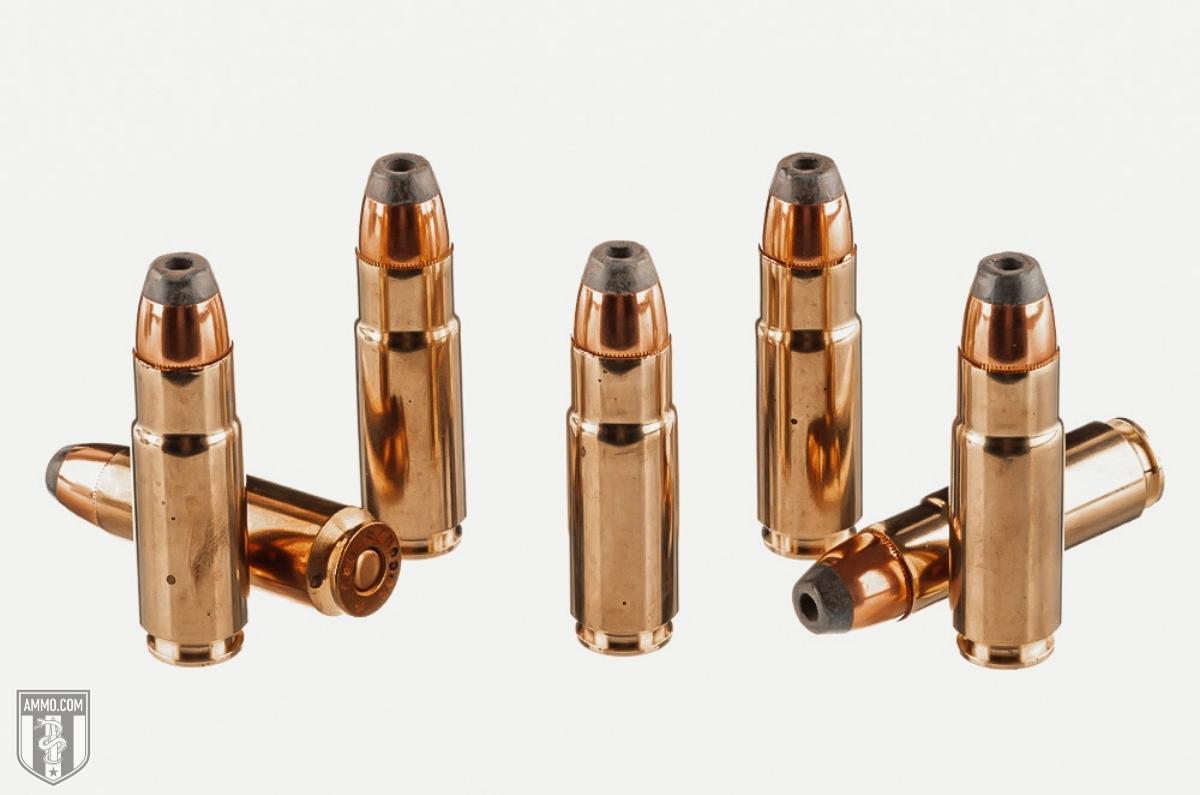
The 450 Bushmaster and 50 Beowulf are excellent deer hunting options for Midwest states that require the use of straight-walled cartridges. The 450 Bushmaster is also unique in the fact that there are single shot and bolt-action rifles available for hunters that are required to use these firearms whereas the 458 and 50 are relegated to the AR-15 platform only.
For larger game like elk, black bear, and even moose, I’d favor the 458 SOCOM primarily due to the Barnes 300gr TTSX bullet as it was designed specifically for this cartridge. This bullet is absolutely devastating to large game so long as your shot placement is on point.
Selecting the right thumper round for your needs primarily revolves around your local hunting regulations, the type of game you want to hunt, and the ranges you expect to shoot at.
Regardless of which cartridge you choose, make sure you get all your ammunition here at Ammo.com and get out to the range so you are always ready to defend freedom should the need arise.
Ammo Comparisons
- .308 vs 5.56
- 6.5 Creedmoor vs .308
- .300 Blackout vs .308
- .300 Win Mag vs .308
- .243 vs .308
- .308 vs .30-06
- 7mm-08 vs .308
- .270 vs .308
- 7.62x39 vs .308
- .223 vs .308
- .338 Lapua vs .308
- .380 ACP vs 9mm
- .223 vs 5.56
- .300 Blackout vs 5.56
- 9mm vs 45 ACP
- 9mm vs 40 S&W
- .357 SIG vs 9mm
- 10mm vs 9mm
- 9mm vs 9mm Luger
- .243 vs .270
- .300 Win Mag vs .30-06
- .270 vs .30-06
- .40 vs .45
- 38 Special vs 357
- 9mm vs 40 vs 45
- 5.56 vs 7.62x39
- 338 Lapua vs .30-06
- .30-30 vs .30-06
- 300 PRC vs 338 Lapua
- .30-06 vs 7mm
- 300 Win Mag vs 338 Lapua
- 300 PRC vs 300 Win Mag
- 300 WSM vs 300 Win Mag
- 338 Win Mag vs 338 Lapua
- 12 Gauge vs 20 Gauge
- 10mm vs 357 Mag
- .30-30 vs 7.62x39
- 224 Valkyrie vs 22-250
- 17 HMR vs 22 Mag
- 7.62x39 vs .300 Blackout
- 45 ACP vs 45 Auto
- 45-70 vs 30-30
- 300 Blackout vs 223
- 357 Magnum vs 9mm
- 350 Legend vs 300 Blackout
- 224 Valkyrie vs 223
- 45 ACP vs 38 Super
- 6.5 Grendel vs .308
- 17 HMR vs 22 LR
- 10 Gauge vs 12 Gauge
- 22-250 vs 223
- 45 Colt vs 45 ACP
- 350 Legend vs 30-30
- 5.7x28 vs 223
- 5.7 vs 9mm
- 5.56 vs 5.7
- 22 vs 9mm
- Buckshot vs Birdshot
- 450 Bushmaster vs 308
- 450 Bushmaster vs 223
- Buckshot vs Slug
- 6.5 Grendel vs 5.56 vs 223
- 6mm ARC vs 6.5 Grendel
- 44 vs 45
- 458 SOCOM vs 5.56
- 357 vs 44
- 32 ACP vs 380
- 300 Win Mag vs 338 Win Mag vs 338 Lapua Mag
- 450 Bushmaster vs 458 SOCOM vs 50 Beowulf
- 6mm Creedmoor vs 6.5 Creedmoor
- TMJ vs FMJ
- 44 Special Vs 44 Magnum
- 45 90 vs 45 70
- 6.8 Western vs 6.8 SPC
- 50 Beowulf vs 50 BMG
- 26 Nosler vs 6.5 PRC
- 28 Gauge vs 410
- 6.8 SPC vs 5.56
- 6.8 SPC vs 6.5 Grendel
- 6.8 Western vs 7mm Rem Mag vs .28 Nosler
- 6.8 Western vs 6.5 Creedmoor
- 22 Hornet vs 223
- 6.8 Western vs 6.5 PRC
- .410 vs 12 Gauge
- .410 vs 20 Gauge
- 22 LR vs 22 Mag
- 6mm ARC vs 243
- 7mm-08 vs 270
- 243 vs 6.5 Creedmoor
- Nickel vs Brass Casing
- 204 Ruger vs 223
- 50 Beowulf vs 5.56
- 260 Remington vs 6.5 Creedmoor
- 6mm Remington vs 243
- 28 Nosler vs 300 PRC
- 50 Beowulf vs 50 AE
- 22 Nosler vs 22-250
- 450 Marlin vs 45-70
- 300 Win Mag vs 300 Norma
- 458 SOCOM vs 300 Blackout
- 38-55 vs 45-70
- 22 Hornet vs 22 LR
- 300 Norma vs 338 Lapua
- 338 Lapua vs 50 BMG
- 28 Nosler vs 300 Win Mag
- 28 Nosler vs 6.5 Creedmoor
- 204 vs 22-250
- 458 SOCOM vs 45 70
- 44 40 vs 45 70
- 6.8 SPC vs 6.5 Creedmoor
- 450 Bushmaster vs 30-06
- 7mm Rem Mag vs 300 Win Mag
- 30 Carbine vs 223
- 25-06 vs 30-06
- 26 Nosler vs 28 Nosler
- 16ga vs 12ga
- 30 06 vs 7.62 x54R
- 9mm Makarov vs 9mm Luger
- 350 Legend vs 223
- 30 Carbine vs 5.56
- 6.5x55 vs 6.5 Creedmoor
- 6.5 Creedmoor vs 270 vs 25-06
- M193 vs M855
- 450 Bushmaster vs 458 SOCOM
- 6.5 Grendel vs 6.5 Creedmoor
- 350 Legend vs 5.56
- .277 Fury vs 6.8 SPC
- 277 Fury vs 300 Win Mag
- 10mm vs .45 ACP
- 277 Fury vs 223
- 6.8 SPC vs 300 Blackout
- 6.5 PRC vs 6.5 Creedmoor
- 277 Fury vs 308
- 277 Fury vs 6.5 Creedmoor
- 350 Legend vs 450 Bushmaster
- 277 Fury Vs 5.56 NATO
- 10mm vs 40S&W
- 32 ACP vs 9mm
- 32 Special vs 9mm
- 8.6 Blackout vs 300 Blackout
- 30 Super Carry vs. 9mm
- 5.56 vs 9mm
- .50 Action Express vs 9mm
- 7.62x25 vs. 9mm
- 10mm vs 44 Magnum
- 300 Blackout vs 300 Win Mag
- 6.5 Grendel vs 300 Blackout
- 460 Rowland vs 10mm
- 300 RUM vs 300 PRC
- 300 Norma vs 300 PRC
- 45 GAP vs 45 ACP
- 7mm PRC vs 300 Win Mag
- 300 PRC vs 6.5 Creedmoor
- 300 PRC vs 308
- 357 SIG vs 357 Mag
- 7.62x39 vs 7.62x51
- 243 Win vs 223 Rem
- 30 Nosler vs 300 PRC
